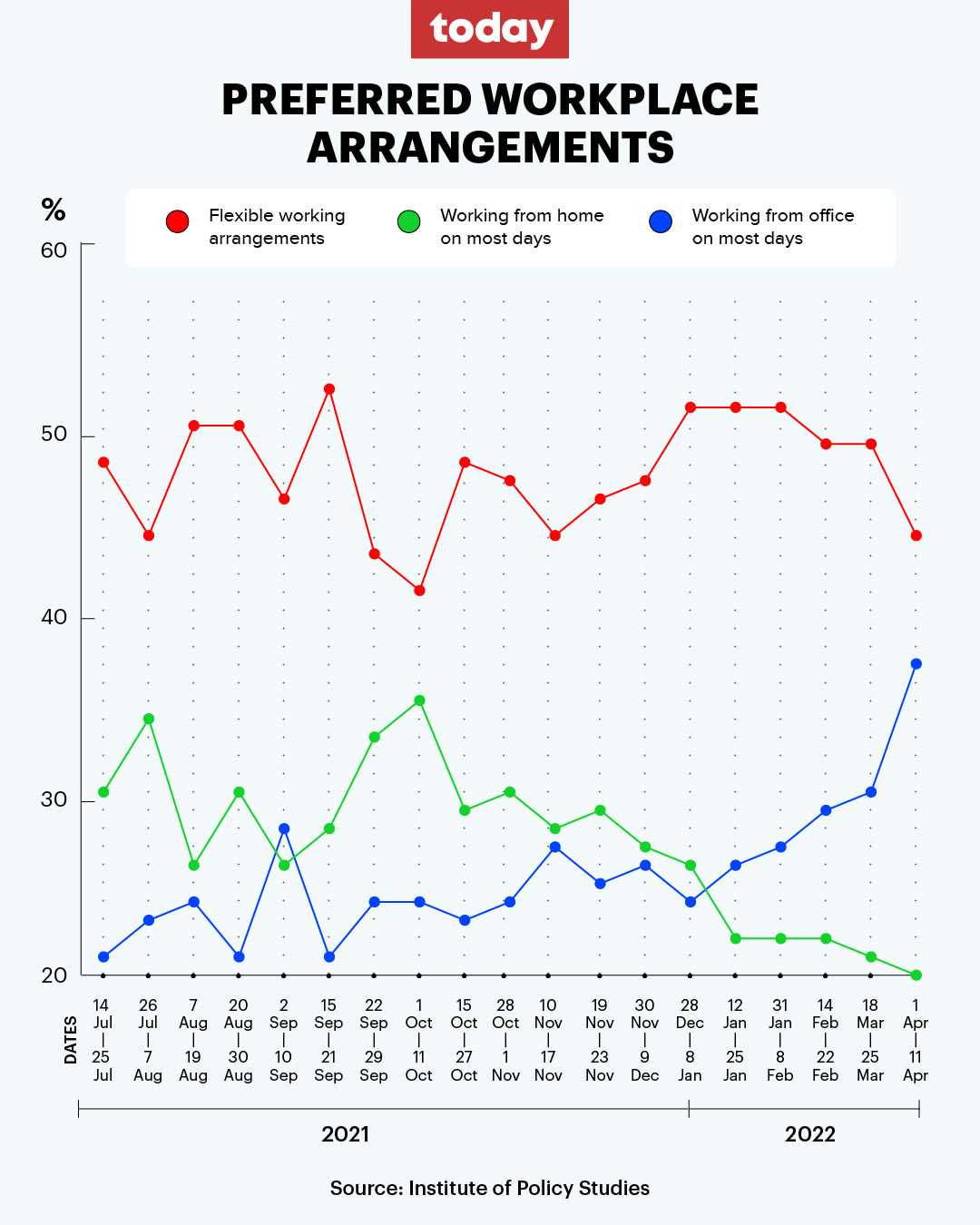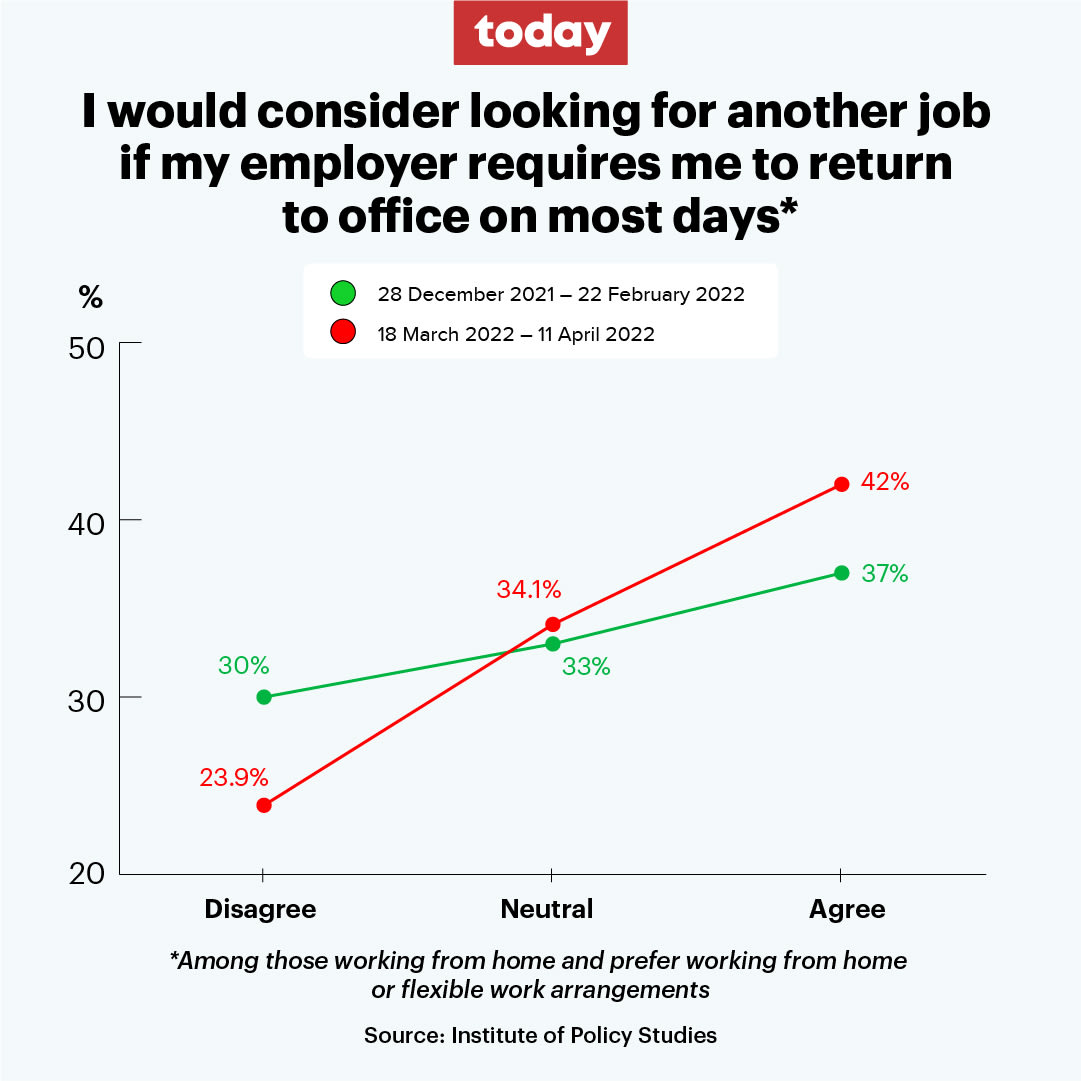Fewer people prefer working from home on most days but attitudes hardening among those who do: IPS survey
SINGAPORE — As Covid-19 measures have eased over the last few months, more employees think that going back to the office should be the new normal, but for those who prefer to work home, more of them would consider looking for another job if their employers require them to return to the office on most days.

- An IPS study has looked at attitudes to working arrangements over the course of the pandemic
- It found that the proportion of workers who prefer working from home has fallen markedly over the past year or so
- However, among those who prefer to do so, attitudes are hardening
- A growing proportion said they would consider looking for another job if their employer required them to return to the office on most days
SINGAPORE — The proportion of people who prefer to work from home on most days has fallen sharply as Singapore moves into living with Covid-19 but attitudes among this shrinking group are hardening, with four out of 10 saying they would consider quitting if their employers force them to return to office.
These were among the findings in a study about the the attitudes towards work and workplace arrangements here during the Covid-19 pandemic by the Institute of Policy Studies (IPS) released on Monday (April 25).
More than 2,000 citizens and permanent residents aged 21 and above were surveyed over nine months from July 14 last year to April 11 this year, which covered the period from the Phase Two (Heightened Alert) to the recent further easing of Covid-19 measures.
The survey found that between the months of July and August last year, 34 per cent of respondents said that they felt that working from home on most days was the new normal, but in April, only 20 per cent of respondents felt this way.
Conversely, in July last year, only 21 per cent or respondents felt that working from the office on most days should be the new normal, but by this month, that proportion had risen markedly to 37 per cent.

“This suggests that there has been a shift in attitudes towards living with Covid-19 as more employees return to the office, and as Covid-19 case numbers come under control.IPS study”
The study stated that the increase in preference for working from the office coincided with the easing of community safe management measures announced on March 24, which allowed a greater percentage of employees to return to the workplace.
"This suggests that there has been a shift in attitudes towards living with Covid-19 as more employees return to the office, and as Covid-19 case numbers come under control," the study stated.
However, for those who are working from home and prefer to continue doing so, more have indicated that they would consider changing jobs if working from the office becomes the default.
Respondents were asked if they would consider looking for another job if their employer requires them to return to office on most days.
During the period between Dec 28 last year and Feb 22, 37 per cent of respondents faced with this prospect said that they would consider looking for another job, but among those surveyed from March 18 to April 11, when there was a further relaxation of Covid-19 measures, this figure grew to 42 per cent.
Elaborating on the results at a media briefing on Monday, principal research fellow and head of IPS Social Lab Mathew Mathews said the findings show increasingly that employees who have adapted well to working from home would want these flexible work arrangements to continue.
"There is a lot of interest, at least locally, for employees who want to find employers who would feel that it's important for employees to have this kind of flexibility," he said.

He added that people's work aspirations have also changed through the course of the pandemic.
"In general, the prospect of being able to live and work at the same time is appealing to a lot of people," he said. "People want to see these things married in a much more seamless way, rather than feeling that (they) just can't do any of the things valuable to their lives such as family and children."
He reiterated that the group that they had posed this question to are those who are "among people who are currently working from home most of the time and enjoy doing that... that group is wanting to move if they don't continue to have the same kind of measures".
Ms Fiona Phoa, research assistant at IPS Social Lab, added that the increase in those wanting to change jobs could be triggered by the easing of Covid-19 restrictions.
"After seeing the relaxation of measures, (people) may be encouraged by employers to go back to office more, and this may have pushed them to feel more eager to change jobs."
“In general, the prospect of prospect of being able to live and work at the same time is appealing to a lot of people.IPS principal research fellow Mathew Mathews”
The study, led by Dr Mathews, was also co-authored by Ms Phoa, associate director of IPS Social Lab Mike Hou, and research associate Elizabeth Lim.
Other findings in the study include:
MORE WOMEN PREFER TO WORK FROM HOME THAN MEN
- The study showed that around 73 per cent of female respondents preferred to work from home on most days or have flexible work arrangements, compared to 66 per cent of male respondents who felt this way
- For women with dependants, 94 per cent preferred to work from home on most days or have flexible work arrangements, while the figure for men was 86 per cent
- "The differential gendered preferences for work arrangements in the new norm possibly reflects how females continue to be burdened with the lion share of domestic care work," read the study
Dr Mathews said that there is "quite a bit to juggle" for mothers with young children who have to still go back to the workplace regularly.
He added that while it would help women in such situations if they were granted more workplace flexibility, "it would also help men to get more involved with the care responsibilities and caregiving roles".
THOSE WITH CAREGIVER DUTIES PREFER FLEXIBLE WORK ARRANGEMENTS
- Respondents with aged persons at home were more likely to feel that flexible work arrangements should be the new norm for workplaces (52 per cent) as compared to those with children (44 per cent) or those with both children and aged persons at home (37 per cent)
- "They may prefer the flexibility to arrange their work schedule around caregiving needs of the aged persons," the report said
- Those with children at home were more likely to feel that working from home on most days should be the new norm at workplaces (28 per cent) compared to those with aged persons (22 per cent) or those with both aged persons and children at home (25 per cent)
- However, more respondents with both children and aged persons at home also feel that working from the office on most days should be the new norm for workplaces (38 per cent) as compared to respondents with children (28 per cent) or respondents with aged persons at home (26 per cent)
- "One possible reason for this could be that aged persons at home might serve as a helpful resource for some families in the care of their children when respondents go to work," the study said
MORE RETURNING TO WORKPLACES AS RESTRICTIONS EASE
- The proportion of respondents who had to return to their workplaces on most days increased from 51 per cent at the start of the study in July last year to 74 per cent in April
- Following the announcement of the easing of workplace management measures in March, the proportion of those returning to workplaces surged from 62 per cent at the end of March to 74 per cent in April
- However, through the course of the survey, some respondents felt "cajoled" to return to office
- Between 37 and 42 per cent of respondents who currently work from home most or all of the time felt pressured to return to the office on most days. This figure has been "steadily decreasing," the study revealed
Despite the trend towards more workers returning to office on most days, Dr Hou, one of the paper's authors, said that the workplace should not revert to the pre-pandemic arrangement where "people mostly view the workplace as just a place where you go physically to perform work".
"It should be seen as a place where coordination and collaboration thrive," he said.
"That has implications on the physical set-ups of the office that (employers) would want to consider (such as for) increasing collaborations and team building in the kind of work that they do rather than simply have siloed spaces that people work in."
BOTH EMPLOYERS AND EMPLOYEES HAVE TO BE FLEXIBLE: ASME
Responding to the findings by IPS, Mr Kurt Wee, the president of the Association of Small and Medium Enterprises (ASME), said he found it "quite surprising" that such a large proportion of employees who prefer to work from home would consider quitting their jobs if asked to return to the office by default.
"... because it's hardly tough rule at all if companies require their workforce to work from office, but at the same time, I'm not sure whether these perspectives and habits are going to be permanent," he said.
Nonetheless, he encourages both employers and employees to maintain some flexibility in their work arrangements.
"It makes the company more nimble, and in any risk event, at least there is a readiness level (among the workforce) to mitigate its impact."
He also agreed with Dr Hou that companies cannot revert to a pre-pandemic workplace immediately.
"I suggest employers continue to maintain a small proportion of a hybrid format (and) businesses should not go straight back into the old format," he said. "I wouldn't be surprised if we experience little (Covid-19 infection) waves, and I think a small proportion of hybrid working maintains readiness levels in the company."











